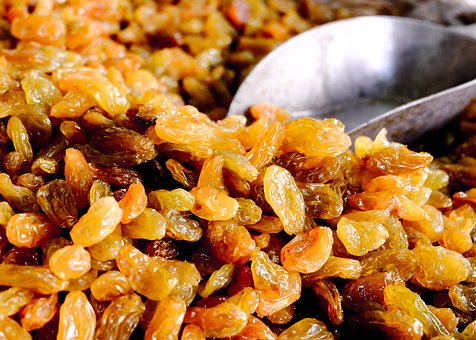
Ibn al-Qayyim: Raisins Aid Digestion, Are Good For the Memory and Have Many Other Health Benefits
Posted by SoundHealth on Tuesday, December, 30 2008 and filed under Prophetic Medicine
Key topics: Raisins

The scholar Ibn al-Qayyim in his work "The Prophetic Medicine" described raisins as dried sweet grapes. He said that the best raisins were large-bodied, plump, thin skinned.
Some of the health benefits he mentioned about raisins were found in the flesh of the fruit. He said that they could be beneficial for the trachea, chest, lungs, and kidney and bladder pains. Other benefits he mentioned were:
- Strengthening the stomach
- Aiding digestion
- Promoting bowel movement
- Good for the memory
In summary, Ibn al-Qayyim said that raisins provided sound nourishment and the best type were seedless.
What Are raisins?
Raisins are dried grapes and consist of 70% pure fructose and contain fiber, antioxidants, iron, potassium, and calcium. Raisins are also packed with phytonutrients and are a source of the trace mineral, boron.
When the grapes are converted to raisins, they lose some of their beneficial phenols through the grape-drying process, but grapes seem to be least affected by this process compared to other dried fruit such as apricots and prunes.
Some of the health benefits of raisins include:
- bone health
Boron is a mineral critical to bone health and osteoporosis. It is required to convert estrogen and vitamin D into their most active forms. Studies have shown that boron provides protection against osteoporosis and can reproduce the positive effects of estrogen in postmenopausal women. Raisins are among the top foods that contribute to dietary boron.
- Macular Degeneration
A study published in the Archives of Ophthalmology found that eating fruit daily, including dried fruit, could lower the risk of developing age-related macular degeneration. This disease is the primary cause of vision loss in older adults.
Tips on Eating Raisins
- To prolong the shelf life of raisins and to prevent them from becoming dried out, they can be stored in the refrigerator.
- Raisins will be the most fresh if consumed within six months.
- Commercially grown dried raisins and other dried fruit may be treated with sulfur dioxide or other sulfur-containing compounds as preservatives to help prevent oxidation, bleaching of colors and to extend their shelf life.
Sulfur dioxide itself is poisonous when inhaled, and although sulfur dioxide fumes aren't inhaled when eating dried fruits treated with the gas, the residues left on the fruit alter its nutritional value and can have adverse effects the body. It is therefore advisable to check labeling when buying all dried fruit and avoid sulfite-preserved food.
References for further reading
- Cho E, Seddon JM, Rosner B, Willett WC, Hankinson SE. Prospective study of intake of fruits, vegetables, vitamins, and carotenoids and risk of age-related maculopathy. Arch Ophthalmol. 2004 Jun;122(6):883-92. 2004. PMID:15197064.
- Karadeniz F, Durst RW, Wrolstad RE. Polyphenolic composition of raisins. J Agric Food Chem 2000 Nov;48(11):5343-50 2000. PMID:13500.
- Karakaya S, El SN, Tas AA. Antioxidant activity of some foods containing phenolic compounds. Int J Food Sci Nutr 2001 Nov;52(6):501-8 2001. PMID:13490.
- Maffei Facino R, Carini M, Aldini G, et al. [Regeneration of endogenous antioxidants, ascorbic acid, alpha tocopherol, by the oligomeric procyanide fraction of Vitus vinifera L.:ESR study]. Boll Chim Farm 1997 Apr;136(4):340-4 1997. PMID:13570.
- Rainey CJ, Nyquist LA, Christensen RE, et al. Daily boron intake from the American diet. J Am diet Assoc 1999 Mar;99(3):335-40 1999. PMID:13510.
- Schuurman AG, Goldbohm RA, Dorant E, van den Brandt PA. Vegetable and fruit consumption and prostate cancer risk: a cohort study in The Netherlands. Cancer Epidemiol Biomarkers Prev 1998 Aug;7(8):673-80 1998. PMID:13520.
Health, fitness and longevity
Based upon the principles of health
in the Qur'an and Prophetic Traditions.
HealthyMuslim.Com
There are two bounties in which
most people lose out: good health
and free time. Al-Bukhari.